Whatever happened to ESP?
Psi powers—telepathy, telekinesis, precognition, and other parapsychological activity—was one of the founding tropes of science fiction, up there with rocket ships, time travel, and aliens. John W. Campbell coined the term “psionics”—from psi and electronics—and encouraged his stable of authors to write about it. And so they did.
But after reaching maximum saturation in the 1950s, psionics began disappearing from SF in the 70s, became uncommon by the 90s, and are a rarity today. (That’s one of the reasons I wanted to write one. I miss them!) The five books below, as well as being some of my favorite novels, show how the subgenre evolved, and why I think it’s unlikely to go extinct.
The Ur Text: Slan by A.E. Van Vogt
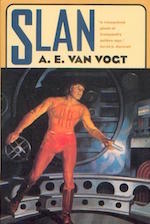 It’s hard to overstate the importance of Slan to science fiction. Van Vogt’s prose style is not to everyone’s taste (see Damon Knight’s infamous essay dismantling Van Vogt in In Search of Wonder), but the power is in its big idea: a hidden race of supermen, wielding awesome mind powers, is secretly controlling the world.
It’s hard to overstate the importance of Slan to science fiction. Van Vogt’s prose style is not to everyone’s taste (see Damon Knight’s infamous essay dismantling Van Vogt in In Search of Wonder), but the power is in its big idea: a hidden race of supermen, wielding awesome mind powers, is secretly controlling the world.
Slan, which was first serialized in 1940, established the idea that psi powers go hand in hand with the evolution of the human race. To paraphrase Bowie, you gotta make way for homo superior. Van Vogt’s ubermensch conspiracy resonated deeply, and perhaps not healthily. The early science fiction community embraced “fans are slans” exceptionalism—weren’t SF readers smarter and more special than the “mundanes?” Every psi story to follow had to wrestle with this yearning for a master race.
Psi as a Job: The Demolished Man by Alfred Bester
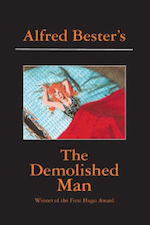 Bester’s novel, which won the first Hugo in 1953, offers one solution to the superman problem: register and license them. In the 24th century there are many “espers,” from low-level class 3’s to powerful Class 1’s, and some of those Class 1’s want to rule the world. Lincoln Powell, a Class 1 esper detective, is chasing a murderer (and latent telepath) that he knows is guilty—Powell read his mind—but because evidence gained via telepathy is not admissible in court, he has to collect evidence the old-fashioned way. Great power, Bester argues, can be reined in by laws and society.
Bester’s novel, which won the first Hugo in 1953, offers one solution to the superman problem: register and license them. In the 24th century there are many “espers,” from low-level class 3’s to powerful Class 1’s, and some of those Class 1’s want to rule the world. Lincoln Powell, a Class 1 esper detective, is chasing a murderer (and latent telepath) that he knows is guilty—Powell read his mind—but because evidence gained via telepathy is not admissible in court, he has to collect evidence the old-fashioned way. Great power, Bester argues, can be reined in by laws and society.
It’s a Family Thing: Mind of My Mind by Octavia Butler
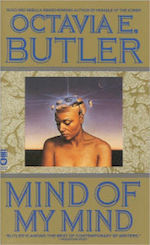 This 1977 novel, the second book in the Patternist series, was the first Octavia Butler novel I read, and it was thrilling. The story is about Mary, a latent telepath who is part of a breeding program orchestrated by a 4,000-year-old immortal, Doro, whose mind hops from body to body. Mary becomes the most powerful psionic in the world (there are flying telekinetics, too) by linking with first six, then over a thousand telepaths in what she calls a Pattern.
This 1977 novel, the second book in the Patternist series, was the first Octavia Butler novel I read, and it was thrilling. The story is about Mary, a latent telepath who is part of a breeding program orchestrated by a 4,000-year-old immortal, Doro, whose mind hops from body to body. Mary becomes the most powerful psionic in the world (there are flying telekinetics, too) by linking with first six, then over a thousand telepaths in what she calls a Pattern.
But typical for Butler, Mary doesn’t want to rule the world; she wants to protect her family, and this community of Patternists. When Doro, feeling threatened, attacks Mary, the group kills him. Butler demonstrates that power for the sake of power is a hollow goal.
Making it Personal: The Hollow Man by Dan Simmons
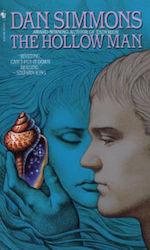 Speaking of hollow… Jeremy, the protagonist of Simmon’s 1992 novel, is a grieving telepath who was married to a woman who shared his powers. When she dies, he can no longer keep out the “neurobabble” of other minds, and so goes on the road, seeking isolation.
Speaking of hollow… Jeremy, the protagonist of Simmon’s 1992 novel, is a grieving telepath who was married to a woman who shared his powers. When she dies, he can no longer keep out the “neurobabble” of other minds, and so goes on the road, seeking isolation.
As in the best SF, metaphors are artfully literalized. The marriage of true minds has dissolved, and Jeremy’s become yet another widower trying withdraw from the world. Then he meets a sociopathic killer whose mind is full of static, a person literally disconnected from all human connection. And Jeremy hears a “voice” calling him, a new telepath who needs his help. The purpose of Jeremy’s life is not to save the world or create a new race: it’s to save one child.
The Next Step in Psi: More than Human by Theodore Sturgeon
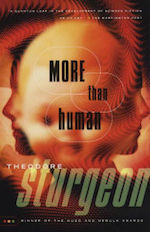 Just to prove that there’s no ultimate psi novel, no master text that this subgenre will evolve into, here’s what I consider a timeless classic in the field. Written over fifty years ago, More than Human is about a group of damaged yet powerful people who gradually find each other. There’s a troubled young man with telepathic powers, a telekinetic girl, two mute twins with the ability to teleport, and Baby, a toddler super-genius. They become more than a family; they’re a new kind of organism: homo gestalt. The organism becomes whole only when it’s joined by a normal man, who serves as their conscience. This new race won’t dominate humans, but work with them.
Just to prove that there’s no ultimate psi novel, no master text that this subgenre will evolve into, here’s what I consider a timeless classic in the field. Written over fifty years ago, More than Human is about a group of damaged yet powerful people who gradually find each other. There’s a troubled young man with telepathic powers, a telekinetic girl, two mute twins with the ability to teleport, and Baby, a toddler super-genius. They become more than a family; they’re a new kind of organism: homo gestalt. The organism becomes whole only when it’s joined by a normal man, who serves as their conscience. This new race won’t dominate humans, but work with them.
More than Human is still finding readers, partly because the creation of homo gestalt—like Butler’s Patternists and the improvised family in Simmons’s novel—captures the way the world feels when we’ve finally found our family. And that’s why psi novels, though they may never again be as popular as they were in the 50’s, will continue to be written. They’re excellent vehicles for showing that mysterious process by which we come together, each of us with an array of abilities and dysfunctions that are mostly invisible to the outside world, and become a little stronger than we were alone. Also? Psionics is just plain cool.
Top image: cover art for French edition of Slan (J’ai Lu, 1977); illustration by Jean Mascii.
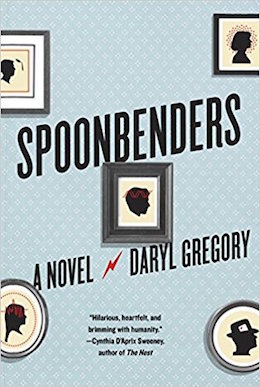 Daryl Gregory’s latest novel is Spoonbenders, about a family of down-on-their-luck psychics, out now from Knopf. Recent work includes the novels Afterparty and Harrison Squared, and the novella “We Are All Completely Fine,” which won the World Fantasy Award and the Shirley Jackson Award. Daryl lives and bends cutlery in Oakland, California.
Daryl Gregory’s latest novel is Spoonbenders, about a family of down-on-their-luck psychics, out now from Knopf. Recent work includes the novels Afterparty and Harrison Squared, and the novella “We Are All Completely Fine,” which won the World Fantasy Award and the Shirley Jackson Award. Daryl lives and bends cutlery in Oakland, California.










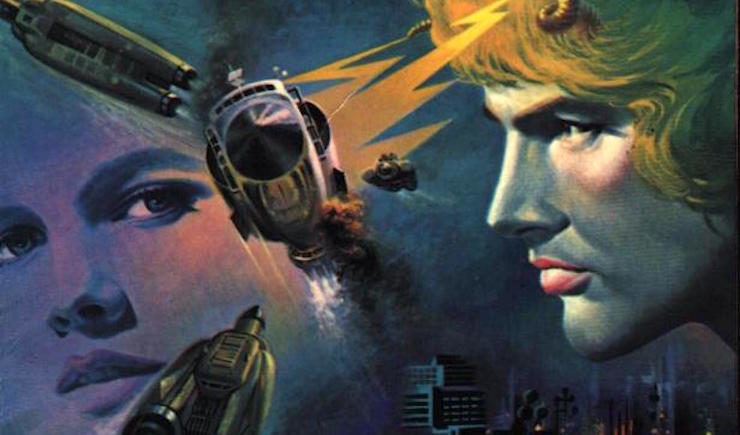
Demigod by Jaron Lee Knuth
I think we know what happened to Psi-powers. Star Wars happened and you couldn’t use them without someone saying “use the force, Luke” in response. Plus Urban Fantasy came along and transitioned Psi-Powers into ordinary magic.
An interesting book series covering that transition is Brian Lumley’s “Necroscope” series. Cold War psi-powered spies, vampires, and vaguely Lovecraftian stuff.
Modern psi-power, disguised as magic but gradually becoming more scientific as the series progresses? You want Ben Aaronovitch’s “Rivers of London” books. Join newly minted constable Peter Grant of the London police force as he encounters magic, ghosts, and river gods, and starts trying to put them into a scientific framework.
Some classic psi powers though in Zenna Henderson’s various works, there is much warmness in her writing and even though many of her characters are aliens they do a good job of bringing insight into the human condition with their use of powers.
https://en.wikipedia.org/wiki/Zenna_Henderson
Curiously, having a child with Down Syndrome act as the central processing unit of Sturgeon’s gestalt was radical for the time (so-called ‘Mongoloids’ were often institutionalized for life, then) and extraordinarily out-of-step with today’s attitudes. I can’t help but wonder if autism would have been used if the novel were written today.
I’m a big fan of Theodore Sturgeon – I sought him out after reading Spider Robinson’s homage to him – and I acknowledge he was a tremendous ‘hippy’. (His novel Godsbody, in which a divine messenger repeats the martyrdom of Christ, is an extended argument for free sexuality and the abolishment of hierarchy and law in favor of love.) But there are still aspects of More Than Human that I found shocking, particularly the way in which gender- and racial-stereotypes are reflected in the way the characters fill the roles in the gestalt. The emotional center is a woman, the ego is a man – and the ‘arms’ are two black women who are mute, seemingly as a consequence of their ability to teleport. Considered individually, none of these character-role pairings are notable, but when you look at the pattern as a whole… I’m generally very resistant to sociopolitical pieties, so if even I found these themes objectionable, more sensitive people would likely pitch a fit.
Maybe not quite as hard scifi as some, but I’ve been a fan of Anne McCaffrey’s for decades, and she has her FT&T books that start with the Pegasus trilogy, “To Ride Pegasus”, “Pegasus in Flight” and “Pegasus in Space”, then leap forward to her Tower and Hive series, “The Rowan”, “Damia”, “Damia’s Children”, “Lyon’s Pride” and “The Tower and the Hive”. (Nerd moment, “To Ride Pegasus”, “The Rowan” and “Damia” start as short stores in “Get Off the Unicorn” ;D )
And not scifi at all, but Mercedes Lackey’s Valedemar books always distinguished between “mind magic” and energy magic, which I always loved.
I am also a sucker for books with psi powers and so I love this list. Thanks!
Dan Simmons, certainly, but I would go with his chilling “Carrion Comfort.” Also worth a look is the “Many Colored Land” series by Julian May.
I instantly thought of Anne McCaffrey’s “Pegasus” and “Tower and Hive” books – set in the same world, in two different time periods. The first book, “To Ride Pegasus”, is a collection of short stories in which it is proven that those abilities exist, and trying to establish an organization to protect them and use their powers for the greater good. “Pegasus in Flight” is set a generation later and has a very different style, having been written much later. “Pegasus in Space” was the last one, written to bridge the first two to the later “Tower”series, which starts with “The Rowan” – in which a small number of very powerful telekinetics use generators to supplement their powers in order to transport ships and cargo carriers to other parts of the solar system and to other star systems. And then to fight aliens.
Definitely Julian May – Pliocene Exile series and the following Milieu books.
Where would comic books be without mental superpowers? Everyone knows Professor X, the most powerful telepath in the world, not to be confused with his DC counterpart, the Martian Manhunter, or even Saturn Girl. Jean Grey metamorphosed into Phoenix, then Dark Phoenix, when she proved unable to control her abilities.
Another series not to be neglected is Marion Zimmer Bradley’s Darkover books. Human colonists landed on Cottman IV, where the natives and local conditions brought forth latent psi abilities. Humans with these abilities usually ended up in Towers, where several psionically gifted people could link together to accomplish more than one could alone. Naturally there were some that rejected this regimen and struck out on their own.
Personally, the very first thing that sprang to mind was Spider Robinson’s varied takes on psi, both mechanical and natural. The Stardancers and Zandor Zudenigo present two very different and compelling takes on telepathy. Throw in the mechanical psi of Mindkiller and you’ve got some interesting thoughts about the nature of psi powers. I also wonder where the collected works of James H. Schmitz are? Telzey, Trigger, and the Witches of Karres would seem to be no brainers in any discussion of psi.
@10 I was also wondering when someone would mention Telzey. Her adventures are some of the best PSI stories I ever read.
And I would also mention Zenna Henderson’s stories of “The People,” secret immigrants from another world who were trying to blend in with humans.
Blizzard’s StarCraft game has telepaths, and two novels in particular, my own Nova and Spectres by Nate Kenyon dealt with telepathy pretty extensively, ditto the Ghost Academy manga written by me and David Gerrold.
I also had telepaths in my SF novel Guilt in Innocence published back in 2011 by Crossroad Press.
—Keith R.A. DeCandido
Ha ha. I think this is the 1st time, in 10 or so yrs of subscribing to this blog that I have read all the stories mentioned in a post. “Slan” definitely #1. My intro to sci-fi was 12 YO, 1963, “Triad”, 1.5″ hardback, “Slan”, “Voyage of the Space Beagle”, “The World of Null-A”. A.E. Van Vogt. “Demolished Man” #2. I was raised up right.
Lensman!!!
and before Van Vogt wrote about a slan, Lewis wrote about aslan…
A really good recent work is Judith Tarr’s Forgotten Suns, which is a character rich story while also having space pirates, rogue intelligence agents, telepaths and living spaceships in a wonderful kitchen sink future.
No Telzey Amberdon? But James Schmitz’s heroine is still refreshing today and was incredibly ahead of her time when the books were written. And Schmitz’s The Witches of Karres is an interesting take on combining powers, too.
Andre Norton also wrote several works featuring characters with psi powers, particularly with humans in telepathic contact with animals, such as in CATSEYE, or in THE ZERO STONE/UNCHARTED STARS duology. There was also Kartr in STAR RANGERS (aka THE LAST PLANET), and probably others as well.
While some of my all time favorite books used psi powers (Bester), they went the same place as family space ships.
We don’t believe in psi anymore. Sure it is possible to have Psi – as long as the novel isn’t *about* psi. Bujold’s Ethan of Athos does this. But a story telling us how this fantasy would work is no longer enough.
That said, other fantasies that use magic or superpowers are still popular.
Joan D. Vinge’s Cat series (Psion, Catspaw, and Dreamfall) were wonderful, challenging books. I doubt she’ll make her way back to Cat, although she is writing again so I have some hope.
Another shout out for James Schmitz.
Also, Alexander Key. The Escape to Witch Mountain may not have been the best Psi fiction ever, but it was the first I remember reading.
From an historical view, The Corsican Brothers is the earliest story I know of where the mystic link between twins allows one to know when the other has been murdered. However, the earliest telepathic communication I know of in science fiction would be in The Night Land, where the narrator describes “sending it with my brain-elements, as I could, and as all may, much or little, as may be, if they be not clods.” Clunky, but I like the “if they be not clods.”
@20,
I am not familiar with The Night Land but at 1912 it certainly is older than the Lensman books which I had thought were the primordial “power of the mind” SF books. Must find this…
What, no mention yet of Asimov (or is that such a low-hanging fruit no one bent down to pick it)?. From the time of Susan Calvin (Liar!), through Giskard and Daneel, to the Mule, the Second Foundationers and Gaia…and that’s only in one of his future histories. Other stand-alone tales exist with mental powers (Nemesis comes to mind). Admittedly he doesn’t go into as much detail as some of the others mentioned here, but I loved those books (Daneel remains one of my all-time favourite characters)
Larry Niven also does some interesting things with psi powers – his Known Space features Gil Hamilton’s telekinesis and any number of telepaths (human, such as Larry Greenberg, and Kzinti, and of course the Thrintun!). And then there is the luck of Teela Brown, which I am inclined to consider as a psi power too.
~lakesidey
For a different way society will respond to telepaths, you can read “Emerald Eyes” by Daniel Keys Moran. It’s a little dated now (written in the 1980s with a war to unify the planet in 2014) but people are still people and their reactions to telepaths are pretty much what you’d expect.
In an older vein, I liked “Three to Conquer” by Eric Frank Russell – when there is only 1 telepath in the world that anyone knows of, and he tells you there’s an alien invasion taking over people’s minds, how do you use him without risking his life and everyhting he can tell you?
@20, The first book with this subject I remember reading is Lois Duncan’s A Gift of Magic. The idea that the ability could be passed down to other generations (or skip them) was interesting. Since the protagonist was young, readers could follow how the ability/power was perceived by family, friends, and strangers as she tried to adjust to a new environment.
How about A Boy and His Dog? Both the Ellison story and the Don Johnson movie. Limited Psi (just with his dog) but fun.
Thank you Random22 for reminding me of Zenna Henderson. I fond my rather battered copy of Pilgrimage the other day but I had forgotten that she was the author of “The Last Step”, a story I have been trying to track down again for years. Surely no discussion of psi in SF can ignore John Wyndham’s great books The Chrysalids and The Midwich Cuckoos? The former in particular is an excellent study of otherness and society’s reaction to it.
Thanks for all these comments. There were so many books, characters, and stories I couldn’t fit into this “5 Books about” format. But the Telzey stories were in my initial list–I loved those stories–as were the Lensman books, Asimov’s the Mule, and Ellison’s “A Boy and his Dog.”
@@.-@, melendwyr, you make excellent points. I’ll need to think about that. I do think that Sturgeon’s great empathy for his characters is important — he seems to never condescend.
I thought The Chrysalids by John Wyndham was considered one of the founding classics of this genre, but if this is supposed to be a “best of” list then I can understand avoiding it because it, like a lot of Wyndham’s work, falls hard into the ubermensch problem.
@21, just to warn you, Hodgson came up with great stories, but his prose fights the reader every step of the way. I’d also suggest skipping the framing story the first time through. I believe there was an adaptation written recently by James Stoddard that’s pretty good.
Oh, and another, more recent book, Crosstalk by Connie Willis. Telepathy exists and all it does is mess up your life.
My #1 would be John Wyndham’s Chocky, whiich sticks in my memory as one of the first books I read as a child that was completely unputdownable.
@14
Just nitpicking: Slan came out in 1940 in magazine form and in book form in 1946, while Lewis first wrote about Aslan in 1950.
Damn. I forgot Chocky.
No love for Silverberg’s Dying Inside?
First SciFi read at age 12 confirmed that Psi was not only real, but it was human destiny- Clark’s Childhood’s End.
Not about an individual’s Psi powers, but the powers to come as part of human evolution.
Still, it gave me the tingle that archetypes do when recognized as part of my human experience: *Gasp* I’m not alone. This is real. Other people know about it too. Even say it out loud. Having it put into an intergalactic context and applied to future generations didn’t matter. It also didn’t ascribe qualities of good or evil to those who had the broad range of powers evolving within them.
Just knowing that someone wrote about it and others read about it was enough of a liberation to keep me going for a while….
The best Psi books I ever read were those by Julian May – particularly the Saga of the Pliocene Exile – a fantastic quartet of books.
In James Schmitz Agent of Vega stories psi is positively routine. Individual facility varies but the weaker can use psi tech to level the playing field. Commercial mind shields are perfectly adequate for all practical purposes unless somehow you get sucked into the Big Leagues.
@35: Yeah, Julian May’s books were great.
Don’t forget Psychedelic-40 by Louis Charbonneau. I read it long ago and have read it many times since. Amazon has a nice description: https://www.amazon.com/Psychedelic-40-Louis-Charbonneau-ebook/dp/B00XZCC4VS.